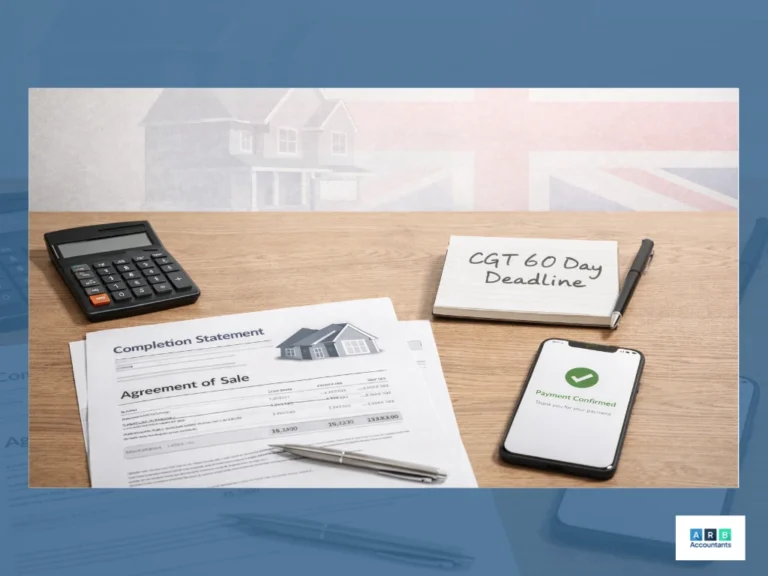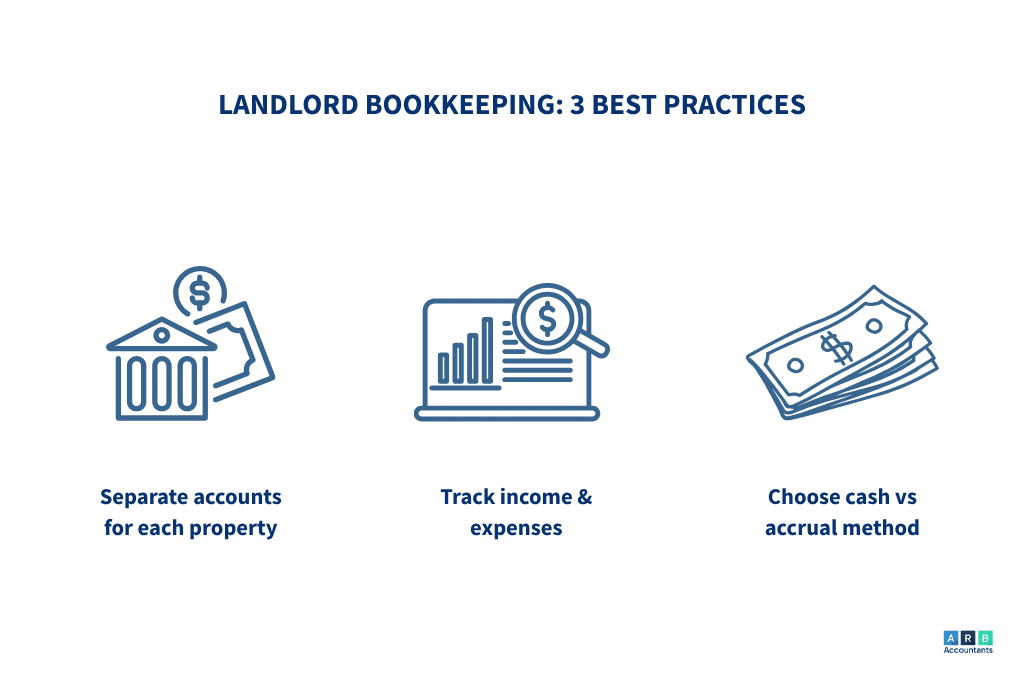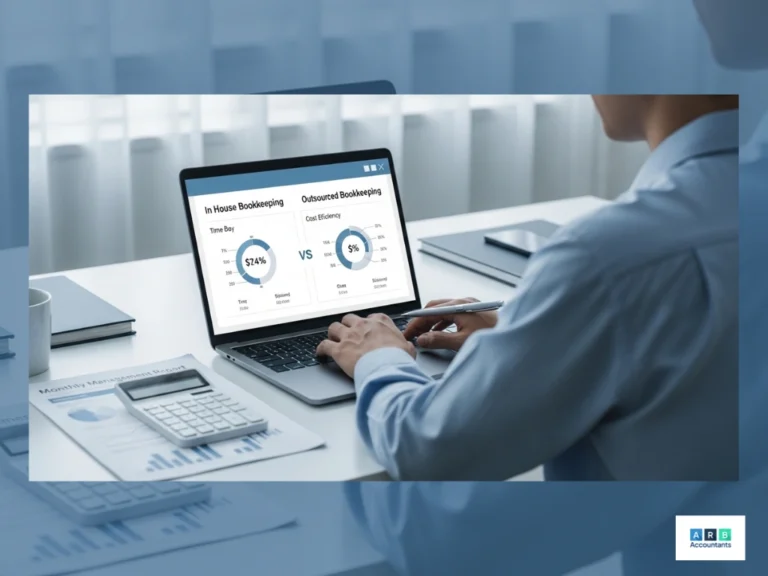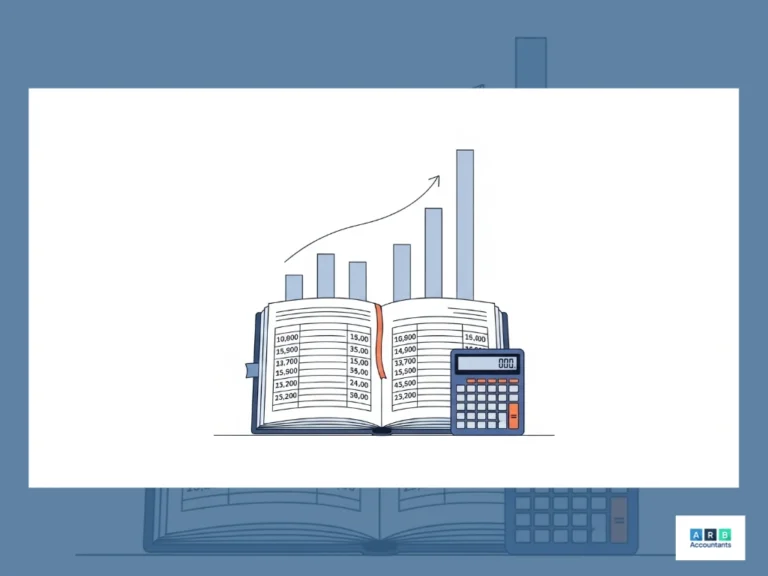
Accounting for Landlords: Bookkeeping Best Practices
If you’re a new landlord or find bookkeeping confusing, you might struggle to know how best to record your financial information. Since accounting for landlords requires accuracy and reliability, it’s essential to understand what’s required. ARB Accountants explain landlord bookkeeping best practices, including the types of records you should keep to simplify your self assessment tax return for landlords.
So, what is bookkeeping best practice for landlords? Landlords should start by separating personal and business accounts. Then, separate accounts need to be set up for each property so you can clearly record and refer back to any income and expenses. Choosing between the accrual or cash accounting method is also important for bookkeeping best practice.
Keep reading to learn more about how an accountant can help a landlord with bookkeeping, including saving money through claiming against income tax.
- What is Bookkeeping Best Practice for Landlords?
- What Property Bookkeeping Mistakes Should Landlords Avoid?
- Which Rental Property Accounts Must Landlords Keep?
- How Can an Accountant Help a Landlord with Bookkeeping?
- Should a Landlord Have a Business Bank Account?
- How Can Landlords Maximise Tax Relief Through Rental Income Accounting?
- What is the Best Accounting Software for Landlords in the UK?
- Why Proper Accounting for Landlords Matters
- Bookkeeping Services at ARB Accountants
- Frequently Asked Questions
What is Bookkeeping Best Practice for Landlords?

Managing rental properties requires accurate rental property bookkeeping to maintain healthy cash flow. From inevitable property maintenance fees to rental income taxes, there are many expenditures that will affect the health of your cash flow. Therefore, learning how to maintain bookkeeping best practices is extremely helpful. Here are the key best practices for accounting for landlords:
Create Accounts for Each Property:
One of the most basic pieces of advice we can provide when starting out as a landlord is to create bank accounts for each property. Setting up bank accounts for each property improves landlord accounting, income, and expense tracking. It simplifies your self assessment tax return for landlords and ensures you’re audit-ready. What’s more, as a landlord you will have to submit a self-assessment to HMRC so having a clear record of your finances from rental income is very important. If you are interested in learning more about self-assessment, take a look at our recent blog.
Decide How to Record Income and Expenses:
It is important to be aware that every income and expense related to the rental property you own needs to be evidenced at the end of the financial year for your self-assessment tax return. Therefore, determining how you are going to keep on top of this task is vital for bookkeeping best practice and accuracy. Some landlords choose to do this by simply filling their receipts and invoices, but this can become quite overwhelming if you are busy and not a very organised person.
Other landlords adopt the use of a spreadsheet system to record the income and expenditure which can be equally effective. Alternatively, you can choose to use accounting software systems which you can input your income and expenses information to. Either way, ensuring that your record of this information is accurate and consistent is the best way forward. This is the foundation of strong rental property bookkeeping.
Choose Your Accounting Method:
As a landlord, you also need to determine whether you are going to use the cash or accrual accounting method. This is important because it ensures that there is consistency in the way your books are maintained. If you would rather record your income and expenses as they take place, not when they are paid, then recording via an accrual basis is ideal for you. This will allow for you to have a more accurate idea of your cash flow and business performance but can be quite time consuming.
If you only wish to record this information when transactions have taken place, then adopting a cash accounting method is the way to go. Either of these methods can be confusing so for accurate accounting for landlords, consulting a tax professional is best.
READ RELATED ARTICLE: How can accountants assist landlords?
What Property Bookkeeping Mistakes Should Landlords Avoid?
Maintaining accurate rental bookkeeping is critical for landlords, yet many fall into avoidable errors that compromise their property bookkeeping and tax compliance. A common mistake is mixing personal and property finances, which leads to confusion during self-assessment and can trigger HMRC scrutiny. Another frequent error is failing to consistently record transactions, resulting in incomplete rental property accounts that complicate rental income accounting.
Some landlords attempt to manually track every receipt, which often becomes overwhelming. Neglecting to use dedicated landlord bookkeeping software or landlord accounting software UK also increases the risk of human error, particularly when reconciling multiple properties.
At ARB Accountants, we advise clients to establish a structured system using bank accounts for landlords, integrated with automated software. This ensures all rental income and expenditure is consistently categorised, supporting accurate self-assessment and simplifying audit preparation.
Which Rental Property Accounts Must Landlords Keep?
Properly structured rental property accounts are essential for accurate accounting for rental properties. At a minimum, landlords should maintain:
- Income ledger per property: Track all rental receipts and security deposits.
- Expense ledger per property: Categorise repairs, maintenance, utilities, and service charges.
- Deposit and prepayment accounts: Record tenant deposits and prepaid rent separately for transparency.
- Maintenance & repair account: Track ongoing property maintenance costs to maximise tax relief.
Using rental property bookkeeping software or landlord bookkeeping software ensures these ledgers are automatically reconciled with bank accounts, streamlining both rental income accounting and reporting for self-assessment.
How Can an Accountant Help a Landlord with Bookkeeping?
It is a great idea for landlords to hire accountants to help with the management of their bookkeeping because it can save a lot of time and stress. However, there are many other ways that accountants can support landlord bookkeeping too. See below to find out more.
Legislation Changes:
Accountants can be very helpful when it comes to changes in bookkeeping, They guide accounting for landlords through changes, ensuring accuracy. Due to bookkeeping being part of their everyday role, accountants are always aware of important legislation changes that may affect their clients, and can communicate this effectively. Not only that, accountants will be able to make changes to any processes or tax reporting information, as and when it is required to do so according to accounting regulations. This can save landlords time and a lot of money that would have been spent on fines for incorrect tax returns.
Claiming Expenses:
Accountants can also help landlords use their bookkeeping information to claim back expenses against taxable rental income. Whilst these expenses must contribute towards the goal of renting out a property, there are a variety of costs that are still attributable. For example, wages of cleaners or gardeners is an expense that can be claimed back against taxable rental income. Their expertise in landlord accounting maximises your claims and reduces your tax liability.
Keeping Accounts Up-To-Date:
Accountants are also great for keeping on top of landlords’ accounts to ensure they are always up-to-date. This is done both accurately and regularly which is extremely helpful to landlords because it can provide them with useful information on their profit and loss. Without an accountant managing your bookkeeping, it can be difficult to determine your financial position which influences your business decisions. Using up-to-date accounts can help you to determine whether you need to cut on costs or whether you have the funds to expand into more properties.
Good accounting for landlords helps with decision-making on growth and compliance.
READ RELATED ARTICLE: Do I need an accountant for rental income?
Should a Landlord Have a Business Bank Account?
As part of bookkeeping best practice, we recommend that all landlords open business bank accounts separate from personal bank accounts. This can be particularly helpful to landlords that have jobs alongside owning rental properties, because it helps to separate the finances and clarify what taxes should be paid. However, if you operate your rental properties through a limited company then it is a legal requirement to have a business account because these are separate legal entities.
Good accounting for landlords starts with separating finances. Having a business account will save both time and money when completing your tax return because a record of all of your income and expenditure relating to the property will be in one place. Furthermore, having a business account can support the future of your rental properties or limited company because you will begin to build a credit history. This is beneficial because it can support you in acquiring loans for the business in the future, if you wish to expand.
Even if you own one property, landlord bookkeeping improves significantly with a separate bank account and helps with your self assessment tax return for landlords. If you are unsure whether to open a business account due to you only owning one property, get in touch today for some expert advice.
How Can Landlords Maximise Tax Relief Through Rental Income Accounting?
Accurate rental income accounting allows landlords to claim all legitimate tax reliefs. Common deductible expenses include letting agent fees, repairs, utility bills, and property management costs. Moreover, landlords can benefit from government schemes such as the Rent-a-Room Scheme, which allows up to £7,500 in tax-free income per year from renting a furnished room.
For example, a landlord renting one property and one room under the Rent-a-Room Scheme can reduce taxable income by several thousand pounds, directly improving cash flow. Using landlord accounting software UK ensures all expenses are categorised correctly and reliefs are applied consistently, supporting compliance with HMRC.
ARB Accountants integrate property bookkeeping with professional tax guidance to maximise claims while reducing risk. By aligning software tools with expert accounting oversight, landlords receive a complete picture of rental income accounting and the tax reliefs available to them.
What is the Best Accounting Software for Landlords in the UK?
Selecting the right landlord bookkeeping software is critical for accurate rental property accounts. The best options offer:
- Automated categorisation of income and expenses
- Integration with multiple bank accounts for landlords
- Detailed reporting for HMRC self-assessment
- Multi-property management capabilities
Popular choices include Xero, QuickBooks, and FreeAgent, all of which support seamless rental bookkeeping and enable landlords to maintain transparent rental property accounts.
ARB Accountants recommends software that allows integration with professional accounting oversight. This dual approach, automated property bookkeeping plus expert review ensures accuracy, reduces manual workload, and maximises potential tax reliefs.
Insider Tip: Even with advanced software, maintaining separate bank accounts for landlords per property provides an additional layer of control, ensuring that rental income accounting is always precise and up-to-date.
Why Proper Accounting for Landlords Matters
When you manage properties, poorly handled records can trigger compliance issues. That’s why accounting for landlords must go beyond simple spreadsheets. Proper rental property bookkeeping ensures that you:
- Know what you can deduct on your self assessment tax return for landlords
- Track ROI on each property
- Make informed decisions on reinvestment or sale
Whether you’re using software or outsourcing to professionals, structured landlord accounting is critical.

We have been working with Saurabh for one year from the very start of our company and he is definitely more than an accountant; he is always there for us, extremely responsive, professional, warm and forward thinking. Highly highly recommended!
Bookkeeping Services at ARB Accountants
If you are a landlord in need of some bookkeeping support from an experienced accountant then ARB Accountants are here for you. Our Accountant Services for Landlords ensures that your records and bookkeeping is in order no matter how many properties you manage.
Whether you are a full-time landlord or work along-side making some additional funds through renting out a property, ARB Accountants are here to support you and your bookkeeping needs. If you have any questions, please don’t hesitate to get in touch by clicking here.






